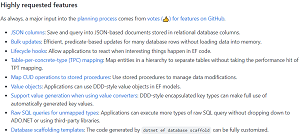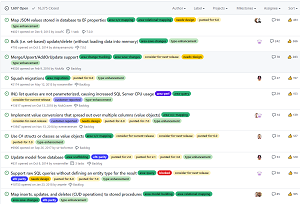News
Microsoft Calls Entity Framework Core 7 Preview 6 the 'Performance Edition'
"Performance is always high on our priorities in EF Core," Microsoft said in announcing the new Entity Framework Core 7 Preview 6 release, which the company dubbed the "performance edition."
It debuted this week along with .NET 7 Preview 6.
"For EF Core 6.0, we concentrated on improving the performance of non-tracking queries, achieving a very significant speedup and making EF Core comparable to raw SQL queries using Dapper," said an announcement post by Microsoft's Shay Rojansky, who pointed here for more information on that EF6 performance edition. "For EF Core 7.0, we targeted EF Core's 'update pipeline': that's the component that implements SaveChanges, and is responsible for applying inserts, updates and deletions to your database."
While query optimizations in EF Core 6.0 sought to reduce query execution times, the update pipeline improvements in .NET 7.0 were different, providing opportunities to improve the SQL sent by EF to the database, along with the number of network roundtrips that occur upon a SaveChanges command. Rojansky said the latter is particularly important for modern application performance in these ways:
- Network latency is typically a significant factor (sometimes measured in milliseconds), so eliminating an unneeded roundtrip can be far more impactful than many micro-optimizations in the code itself.
- Latency also varies based on various factors, so eliminating a roundtrip has an increasing effect the higher the latency.
- In traditional on-premises deployment the database server is typically located close to the application servers. In the cloud environment the database server tends to be farther away, increasing latency.
Rojansky said that in some scenarios the dev team is seeing a 74 percent reduction in time taken for network roundtrips: "That's a four-fold improvement!"
With the release's focus on performance, the bulk of the announcement is devoted to explaining performance enhancements in the following areas (with links to quickly go to more information on each):
 [Click on image for larger view.] Highly Requested Features (source: Microsoft).
[Click on image for larger view.] Highly Requested Features (source: Microsoft).
Going forward the Plan for Entity Framework Core 7.0 lists highly requested features, depicted above.
 [Click on image for larger view.] Open Issues (source: Microsoft).
[Click on image for larger view.] Open Issues (source: Microsoft).
Specifically, the team will address many open issues listed in the project's GitHub repo, some of which are listed in the graphic above.
As can be seen, "Map JSON values stored in database to EF properties" tops the list when it's ordered by the number of 👍 reactions.
Much more information on the plan for EF7 can be found in the GitHub "issues and feature requests for EF Core" page, along with the EF Core releases and planning roadmap.
About the Author
David Ramel is an editor and writer at Converge 360.